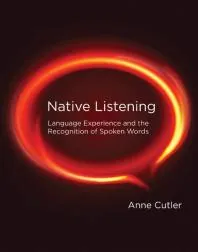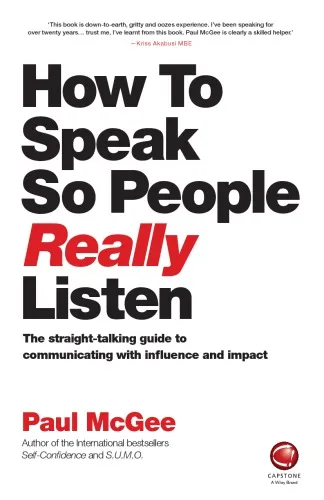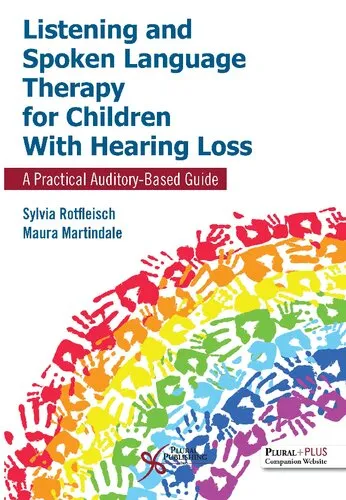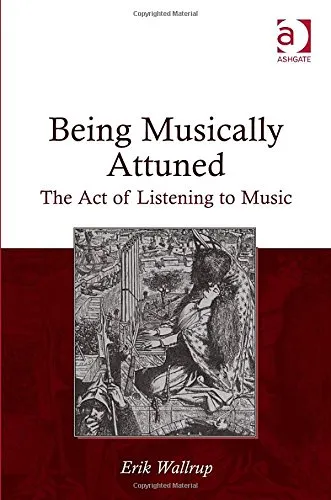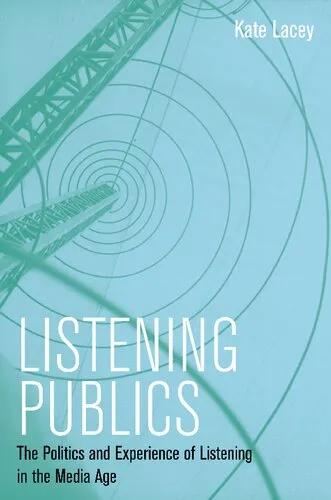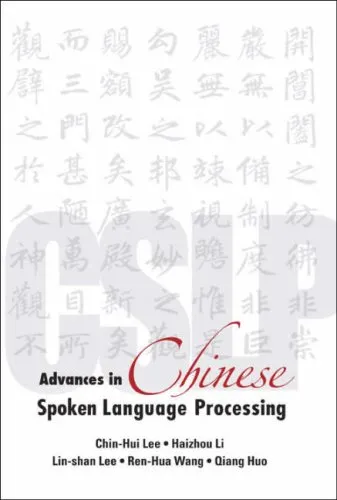Native Listening: Language Experience and the Recognition of Spoken Words
4.7
بر اساس نظر کاربران

شما میتونید سوالاتتون در باره کتاب رو از هوش مصنوعیش بعد از ورود بپرسید
هر دانلود یا پرسش از هوش مصنوعی 2 امتیاز لازم دارد، برای بدست آوردن امتیاز رایگان، به صفحه ی راهنمای امتیازات سر بزنید و یک سری کار ارزشمند انجام بدینکتاب های مرتبط:
مقدمهای بر کتاب «Native Listening: Language Experience and the Recognition of Spoken Words»
کتاب «Native Listening: Language Experience and the Recognition of Spoken Words» نوشتهی من، آن کاتلر، نقطه تلاقی روانشناسی، زبانشناسی، و علم عصبشناسی است. این اثر به بررسی این موضوع میپردازد که چگونه تجربیات زبانی انسانی بر شنیدن و درک کلمات گفتاری نفوذ میکند. زبان مادری ما نه تنها نحوه شنیدن صداها، بلکه شیوهای که مغز ما آنها را پردازش میکند، شکل میدهد. این کتاب با ترکیب مشاهدات علمی خلاقانه و دادههای تجربی قوی، به تحلیل عمیق این فرآیندها میپردازد.
خلاصهای از کتاب
یکی از اصول اساسی این کتاب این است که شنیدن، فرآیندی جهانی نیست و به شدت تحت تأثیر زبان مادری فرد قرار دارد. همانگونه که زبان مادری شکل زبانآموزی و گفتار ما را شکل میدهد، بر گوش دادن هم تاثیر قابل توجهی دارد. کتاب نشان میدهد که چگونه شنوندگان یک زبان خاص صداها را متفاوت از شنوندگان زبانهای دیگر پردازش میکنند و چطور ساختارهای زبانی پیچیده گوش دادن ما را جهتدهی میکنند.
در این کتاب، من بررسی میکنم که چگونه مغز، سیگنالهای صوتی کلامی را رمزگشایی میکند و این فرآیند چگونه تحت تاثیر آموزش زبانی و قرارگیری در معرض زبانهای خاص قرار میگیرد. همچنین با اشاره به تحقیقات متعدد، توضیح داده میشود که چرا زبان مادری بر شناسایی کلمات و حتی درک زبانهای دیگر تأثیر میگذارد.
نکات کلیدی
- تجربه زبانی ما بر نحوه شنیدن و درک کلمات گفتاری تاثیر میگذارد.
- زبان مادری نقشهای برای مغز ایجاد میکند که فرایند رمزگشایی صداها را هدایت میکند.
- گوش دادن فرآیندی جهانی نیست و از یک زبان به زبان دیگر تفاوت دارد.
- یادگیری یک زبان جدید تحت تاثیر نحوه درک ما از الگوهای صوتی زبان مادری قرار میگیرد.
- ادراک شنیداری مبتنی بر ترکیبی از یادگیری، تجربیات گذشته و سازگاری ذهنی است.
نقلقولهای مشهور
کتاب دارای جملات الهامبخش و دیدگاههای علمی بسیاری است. در زیر به برخی از آنها اشاره شده است:
"Listening is selective and language-specific; it reflects the experiences we gain by being immersed in our native tongue."
"The ear listens, but it is the brain that understands. And the brain, shaped by its linguistic environment, changes how it listens."
"To comprehend spoken words is not simply to hear them—it is to decode them within the unique patterns shaped by our linguistic environment."
چرا این کتاب مهم است؟
کتاب «Native Listening» یکی از معدود آثاری است که توانسته است رابطه بین زبان، ادراک و مغز را به شیوهای قابل دسترس تبیین کند. این کتاب نه تنها برای پژوهشگران زبانشناسی و روانشناسی بلکه برای هر کسی که به درک بهتر از چگونگی عملکرد مغز در هنگام شنیدن زبان علاقهمند است، ارزشمند است.
این اثر نشاندهنده قوت علم مدرن در ادغام زمینههای مختلف است و به خوانندگان کمک میکند تا بفهمند که چگونه گوش دادن به چیزی فراتر از یک فعالیت غیرفعال است؛ بلکه فرآیندی پویا و متمرکز بر زبان است که تمام زندگی ما شکل گرفته است.
اگر مایل به درک عمیقتری از تأثیر زبان بر مغز و فرایند شنیداری هستید، این کتاب نه تنها اطلاعات علمی ارائه میدهد، بلکه دیدگاهی تازه و الهامبخش درباره چگونگی تفاوتهای زبانی در جهان آشکار میسازد.
Introduction to Native Listening: Language Experience and the Recognition of Spoken Words
Language is central to human experience, and as listeners, the way we process spoken words is deeply shaped by the language we know. Native Listening: Language Experience and the Recognition of Spoken Words explores the intricate ways in which lifelong exposure to a native language molds our ability to understand spoken language effectively. By delving into the intersection of psychology, linguistics, and cognitive science, this book provides a rich and comprehensive examination of how listening is not just an auditory skill, but a learned, language-specific phenomenon.
This book sheds light on a fundamental truth: the human ability to seamlessly recognize and interpret spoken words is far from universal; it is instead the result of extensive experience with a native language. Detailed investigations of native listening pose profound implications for language learning, speech disorders, and technology-driven communication tools, urging readers to reconsider the processes at work during even the most ordinary conversation.
A Detailed Summary of the Book
The core argument in Native Listening revolves around how listeners of different native languages develop distinctive ways to process speech. In the book, I detail how factors such as vocabulary, phonology, and syntax shape listening strategies. Importantly, these listening strategies are not universal but rather tailored to the specific demands of one’s native tongue.
For example, a speaker of Japanese may not differentiate between certain speech sounds that are distinct in English, while an English listener might struggle to grasp tonal differences that are critical in Mandarin. How our individual linguistic backgrounds inform these differences is where the science becomes compelling. Through discussions of psycholinguistic experiments, studies on bilingualism, and practical applications like speech recognition technology, this book provides deep insights into how humans adapt to their language environment.
The book also does not shy away from the challenges listeners face when confronted with unfamiliar languages. I address how native listening strategies can hinder perception when dealing with non-native accents or entirely new languages. This discussion opens a broader perspective on what it means to learn a language and emphasizes how one’s linguistic past influences future learning.
Key Takeaways
- Native listening is not a universal construct; it is language-specific and shaped by our linguistic experiences from infancy onwards.
- Listeners process spoken words by combining sensory input with expectancies derived from the structure and sound patterns of their native language.
- The same linguistic features that facilitate native listening may impede accurate recognition of speech in unfamiliar languages or accents.
- Speech comprehension, even in everyday conversation, is a sophisticated interplay between auditory perception and cognitive processes shaped by years of language exposure.
- Understanding native listening can provide insights into language learning, the design of speech recognition technologies, and diagnosis of language-related disorders.
Famous Quotes from the Book
"Our experience with our native language tunes every aspect of how we perceive and understand speech."
"Listening does not begin and end with hearing; it is an act of recognition shaped by years of language-specific knowledge."
"The beauty of spoken language lies in its fluidity and its adaptability, yet this fluidity is channeled through the rigid framework of our linguistic experience."
Why This Book Matters
In an increasingly globalized world, understanding how people listen to and interpret spoken language is more relevant than ever. This book bridges the gap between academic theory and real-world applications, making it a must-read for linguists, psychologists, educators, and technology developers alike.
The book challenges traditional views that treat listening as a neutral, passive process. It not only showcases the incredible adaptability of human cognition but also underscores the importance of appreciating language diversity. For educators, the book offers crucial insights into the challenges faced by language learners; for technologists, it emphasizes the need to design speech systems that account for varied linguistic backgrounds.
Ultimately, Native Listening illuminates the profound, often unseen, ways that language shapes how we hear and understand the world around us. By focusing on the role of lifelong language experience, the book contributes meaningfully to broader discussions on how we communicate as human beings, making it a vital resource for anyone interested in the science of language and cognition.
دانلود رایگان مستقیم
شما میتونید سوالاتتون در باره کتاب رو از هوش مصنوعیش بعد از ورود بپرسید
دسترسی به کتابها از طریق پلتفرمهای قانونی و کتابخانههای عمومی نه تنها از حقوق نویسندگان و ناشران حمایت میکند، بلکه به پایداری فرهنگ کتابخوانی نیز کمک میرساند. پیش از دانلود، لحظهای به بررسی این گزینهها فکر کنید.
این کتاب رو در پلتفرم های دیگه ببینید
WorldCat به شما کمک میکنه تا کتاب ها رو در کتابخانه های سراسر دنیا پیدا کنید
امتیازها، نظرات تخصصی و صحبت ها درباره کتاب را در Goodreads ببینید
کتابهای کمیاب یا دست دوم را در AbeBooks پیدا کنید و بخرید
1435
بازدید4.7
امتیاز0
نظر98%
رضایتنظرات:
4.7
بر اساس 0 نظر کاربران
Questions & Answers
Ask questions about this book or help others by answering
No questions yet. Be the first to ask!
